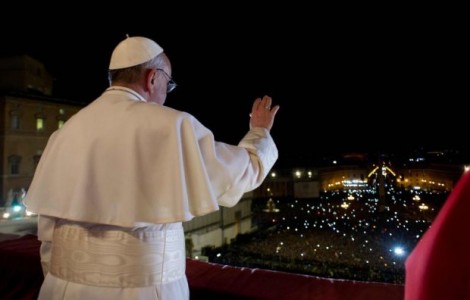 Some news reports that the newly elected Pope, Francisco, is a chemical technician, others that he has a master's degree in chemistry, and still others that he is a chemical engineer.
Some news reports that the newly elected Pope, Francisco, is a chemical technician, others that he has a master's degree in chemistry, and still others that he is a chemical engineer.
Analyzing the news, the truth seems to be that he graduated from a technical school as a chemistry technician, but at the age of 21, he decided to follow the call of faith and become a priest, having taken his life in the direction that led him to become Pope.
Jorge Bergoglio's background in chemistry may have influenced his personality and way of looking at the world, but it could also be the normal path for an intelligent young man, the son of parents with modest resources.
Only Francisco can indicate the importance that chemistry had (or has) in his life. What seems certain is that his election is generating a very favorable chemistry among Catholics.
While not relevant to the definition of his personality and the hope the world places on Francisco, this contradictory news mirrors the confusion that exists between chemistry and chemical engineering.
In fact, just as pharmacists, doctors and nurses are not confused, although they are all linked to health, neither should chemical engineers and chemists be confused, just because both are linked to chemistry.
Chemistry has as its theme the properties and transformation of materials at the level of small quantities. It deals with the analysis and synthesis of materials that already exist or participate in the invention of new materials (for example, new drugs).
Chemical engineering is a branch of engineering that deals with producing these materials in large quantities, optimizing and controlling industrial processes. Put more succinctly: the chemist analyzes and synthesizes materials and molecules while the chemical engineer produces them on a large scale.
Of course there are chemists doing chemical engineering and vice versa but that is no reason to confuse these areas of human activity.
The news also says that Francisco, born in Buenos Aires, likes football, classical music and Jorge Luís Borges. For this reason, I would like to refer to some texts by Borges in which faith, alchemy and chemistry intersect. These too should not be confused and Borges does not. Faith and alchemy are in the domain of the religious and philosophical, while chemistry is in the domain of science and technique. They can complement but not exclude each other.
There are at least two Borges tales in which chemistry appears in the form of conservation laws. The “Book of Sand” is infinite and therefore cannot be burned because it would create an infinite smoke that would suffocate the Earth.
Also in the "Rose of Paracelsus" there is a statement of chemical conservation, in this case associated with alchemy and faith. It is a tale that evokes, in my opinion, one of the most profound parables in the Bible about Faith and miracles.
A would-be disciple makes a long journey to find Paracelsus. See their stills full of dust and their furnaces unlit. He asks for the rose and Paracelsus admonishes him for being gullible. It requires faith from the candidate, but he expects proof. Paracelsus tells him that the miracle will not bring him Faith. Throwing the rose into the fire, the candidate sees only gray. After all, says Paracelsus, «the rose is eternal, only its shape changes».
The atoms of the rose do not disappear when it decomposes or burns, they just change to other molecular arrangements, forming new substances. The candidate for disciple believes he understands, he ceases to be credulous but continues without Faith. And he leaves without waiting for the rebirth of the rose from the ashes.
Author Sérgio Rodrigues (Professor, Department of Chemistry, University of Coimbra)
Science in the Regional Press – Ciência Viva


















Comments